Folic Acid Benefits: 10 Reasons To Boost Your Health
Learn how this manufactured acid can help you prevent some significant health risks.
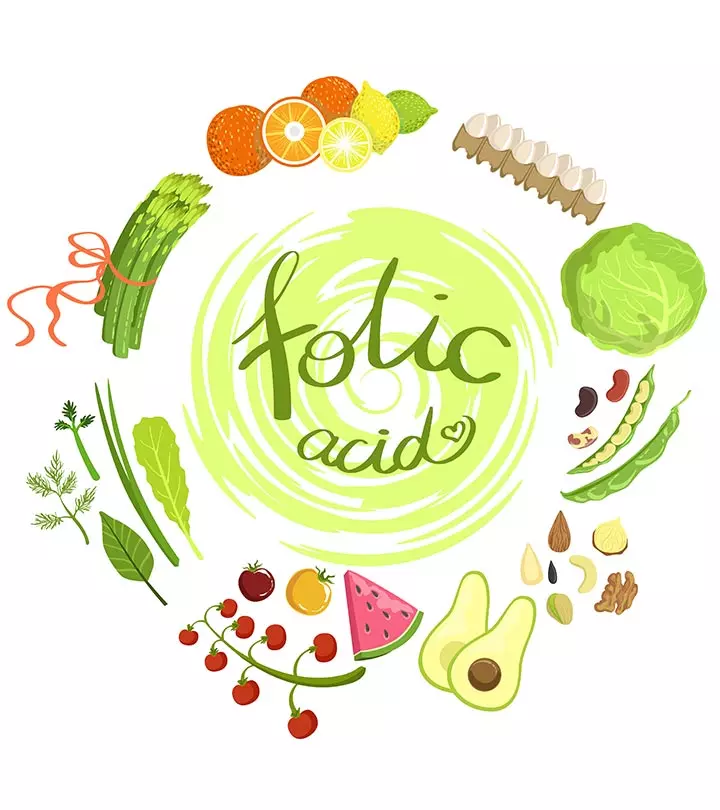
Image: Shutterstock
Folic acid is the man-made form of folate. Folate is vitamin B9. Folate is found naturally in certain fruits, vegetables, and nuts. Folic acid is found in supplements and fortified foods (1).
Folic acid is considerably more bioavailable than dietary folate. The bioavailability of folic acid is assumed to be 100% when it is ingested as a supplement and 85% in fortified foods (1).
The most important role of folic acid is in preventing neural tube defects in the newborn. It may also promote skin and hair health. In this post, we will explore the benefits of folic acid and understand how to prevent its deficiency.
 Did You Know?
Did You Know?In This Article
What Are The Benefits Of Taking Folic Acid?
Folate in foods and folic acid in supplements oversee several critical biochemical reactions in your body. This vitamin is responsible for the synthesis of red blood cells. It prevents anemia and cardiovascular and kidney diseases. Following are the ways folic acid could be useful:
1. May Reduce Risk Of Neural Tube Defects In Newborns
Neural tube defects (NTDs) are common complex congenital malformations of the central nervous system (CNS). Neural tube defects occur within the first few weeks of pregnancy, often before a woman even realizes she is pregnant. The formation of the neural tube in the early phases of embryonic growth depends on healthy cellular development and DNA synthesis, both of which are supported by folic acid (2). Women can considerably lower their chance of these severe congenital disabilities by making sure they consume enough folic acid both before and during the first trimester of pregnancy, emphasizing the significance of folic acid in prenatal care.
These result from failure of the neural tube closure during the formation of the embryo (embryogenesis) (3).
Only 1% of children born with an open NTD are free from disability. These children usually have anesthesia of the skin and abnormalities of the hips, knees, and feet. They have reduced ability to walk, have little or no bowel and/or bladder control, and require frequent surgical interventions (3).
Randomized trials firmly recommend folic acid supplementation to all women who have had an affected pregnancy (4).
Also, this vitamin is involved in the methylation pathway (3). Methylation of several enzymes and proteins might be essential for the neural tube assembly.
The US Public Health Service recommends that all women of conceivable age consume 400 micrograms of folic acid every day (5). However, only 30% of women are able to follow supplementation rigorously.
Several other mechanisms are still being researched upon. Until then, it is safe to presume that folic acid supplementation might partly reduce the risk of NTDs in newborns (3).
2. Might Prevent Cardiovascular Diseases (CVDs)

Research highlights the role of homocysteine, an amino acid, in cardiovascular diseases. Even moderately elevated levels of homocysteine in your blood increase the risk of CVDs. Though concrete results are yet to be arrived at, folic acid could be one of the nutrients that benefit the treatment (6).
The link between them is still being studied. But it is proposed that homocysteine might affect blood clotting, vasodilationi Blood vessels widen during this process due to the relaxation of muscular walls that surround blood vessels. , and thickening of arterial walls.
A study with 1980 Finnish men spanned over 10 years found a connection between folate and homocysteine. The study found a significant inverse association between folate intake and heart disease in men (7).
Hence, 400 μg of folic acid, 2 mg of vitamin B6, and 6 μg of vitamin B12 supplement regimen are followed.
Folic acid also reduces the thickness of arteries, which may prevent atherosclerosisi A condition in which fats, cholesterol and other substances build up along artery walls, potentially leading to blood clots. and stroke.. But a few studies still fail to establish the effect of this supplementation on high-risk individuals (7).
3. Can Mitigate Cancer Risk

Folate has a crucial role in DNA and RNA synthesis, methylation, and cell differentiation. All of these are important for the functioning of your body. A common manifestation of these molecular aberrations is cancer (9).
Cancer is thought to arise from DNA damage and faulty/uncontrolled gene expression. Due to its role in DNA and RNA synthesis and methylation, it is possible that insufficient folate intake contributes to cancer. The shortage of nucleotidesi Organic molecules that serve as building blocks of RNA and DNA. They act as coenzymes crucial for biochemical reactions. and failure to control DNA repair damage might trigger the development of tumors (10).
Experimental evidence links folate deficiency to site-specific cancers. Hence, eating fruits and veggies rich in folate might decrease the incidence of cancer. Having folic acid-fortified food can be a good public health measure (1).
However, recent folic acid intervention trials did not show any specific benefit or harm regarding total and site-specific cancer incidence.
A moderately inverse relationship was found between folate intake (supplements and dietary) and colorectal and breast cancers (11), (12).
Hence, the relationship between folate and cancer risk remains uncertain.
4. Can Treat Anemia In Women And Children
Folic acid helps in generating new red blood cells (RBCs).
Red blood cells carry oxygen to all parts of your body. Decreased red blood cell production in the body can lead to (megaloblastic) anemia (1).
The odds of developing anemia are 40% more in folic acid-deficient women than their counterparts (13). This suggests the significance of folate in the synthesis of RBCs (erythropoiesis). Folate, in the form of 5,10-methylene-THF (tetrahydrofolate), is essential for the DNA nucleotide synthesis (14).
When there is folate deficiency, there is reduced availability of 5,10-methylene-THF. This deficiency also inhibits DNA synthesis (14).
RBCs are made in the bone marrow, where the rate of cell division is very high. If folate is deficient, precursor cells might only divide, but the genetic material cannot. This results in increasing the intracellular volume but not the genetic matter. Thus, the RBCs look swollen, causing megaloblastic anemia (14).
Hence, folic acid supplementation can reduce anemia. It is essential for older and pregnant women. They have higher chances of anemia because of the years of menstrual blood loss and higher nutrient demand (15).
How Does Folic Acid Get Metabolized?
- Folic acid must first be converted to dihydrofolate (DHF) and then to tetrahydrofolate (THF) to become metabolically active (15).
- This enzymatic process is catalyzed by the enzyme DHF reductase (DHFR).
- THF can be converted to the biologically active L-methylfolate by the enzyme methylenetetrahydrofolate reductase (MTHFR).
- This key conversion is necessary to provide L-methylfolate for the nucleotide synthesis during DNA and RNA assembly, DNA methylation, and to regulate homocysteine metabolism.
- L-5-Methyltetrahydrofolate (L-methylfolate) is the predominant micronutrient form of folate.
- It circulates in plasma and is involved in the biological processes. This active form of folate is taken up within minutes by the liver and other primary targets.
5. Is Essential During Pregnancy And Childbirth

As it is vital for DNA and protein synthesis, folate has a primary role in fetal growth and development. That’s why there is an increased demand for folate in pregnant women. In the presence of enough folic acid, the embryonic cells divide and differentiate into tissues and organs.
The neural tube is one of the earliest structures to form. This structure is flat at first but molds into a tube only one month after conception. The neural tube develops to become the brain and spinal cord.
Without enough folic acid, the cells in this structure can’t grow properly, and the metamorphosis of this tube to the spine and brain is left incomplete. This leads to neural tube defects (15), (16).
Also, observational studies suggest that folate may be necessary during labor. Folic acid supplementation during prenatal care may prevent preterm births and birth defects. It may also protect against miscarriages, stillbirth, multiple pregnancies, and more. (16).
Research seems to be in favor of folic acid supplementation for more than a year prior to conception (16).
In a study of 1285 women of childbearing age, it was found that only 13.9% supplemented folic acid, with 65.3% doing so daily. Alarmingly, 91.1% were unaware of the recommended dose, while 43% didn’t know its role in the body. However, 52.4% of women who were not currently supplementing folic acid reported planning to do so during pregnancy. Women’s awareness of folic acid’s role and the information they received from physicians were key factors that influenced their decision. These findings highlight the need for increased information about the importance of folic acid supplementation.
6. Helps Manage Polycystic Ovarian Syndrome (PCOS)
PCOS (polycystic ovary syndrome) affects at least 10-15% of women of childbearing age (17). It brings down the quality of oocytes. PCOS is one of the factors responsible for the failure of in-vitro fertilization (IVF) (18).
Hormone therapy, change of lifestyle, and diet might help. Women with PCOS should take more of folic acid, vitamins D, C, and B12, dietary fiber, and calcium, potassium, magnesium, and zinc.
They should cut down on the consumption of total fats, saturated fatty acids, and cholesterol because these foods might trigger CVDs and diabetes. They might eventually worsen the dysfunction of ovaries (17).
Patients undergoing IVF treatment showed better fertilization rate and embryo quality. Folic acid also restored ovulation in a few women (18).
7. May Control Hair Loss
Many people use folic acid for hair growth although its direct role in promoting hair growth is not scientifically proven. However, folate helps in producing red blood cells and facilitates oxygen transport to your body. It might do the same to the hair-building tissues (19). This way, folate could stimulate the proliferation of the hair follicle cells. It might prevent the graying of hair and regulate the functioning of sebum glands in the scalp (19).
Having beets, kale, Brussels sprouts, green peas, white beans, asparagus, kohlrabi, and eggs can boost folate levels in women (19). Supplementing your diet with 400-1000 μg of folic acid is another way to stop hair fall (20).
However, a few studies show no significant difference in serum folate levels of patients with alopecia. This shows that folic acid supplementation may or may not control hair loss. You might have to look at other vitamins like biotin, vitamin B12, vitamin D, etc. (21).
8. May Help Cope With Depression And Anxiety
One of the main functions of folate is to bring about methylation reactions. Most biomolecules need to be methylated to be biologically active. The active form of folate/folic acid, 5-methyl THF, adds methyl residues and kick starts such reactions (22).
The neurotransmitters in your central nervous system (CNS) also need to be methylated after their synthesis. You will need enough folate at this stage. It has been proven that low folate levels can cause severe and prolonged episodes of depression and anxiety (22). Low folate levels have also been linked to memory loss and mortality(N).
Another way in which folate can help is by reducing homocysteinei An amino acid that is broken down by folate and certain B-vitamins to provide the body with necessary chemicals. levels.
Elevated homocysteine levels in your body cause oxidative stress on your brain and CNS (21). Folic acid supplementation can bring down homocysteine and oxidative stress levels.
You tend to respond better to antidepressants if you have enough folate (21).
9. May Treat Kidney Disease And Improve Kidney Function
Hyperhomocysteinemia (accumulation of homocysteine) occurs in 85% of patients with chronic kidney disease. This happens because of impaired renal function. Hyperhomocysteinemia is also an indicator of poor cardiovascular and kidney health (23).
One way to control hyperhomocysteinemia is through folic acid supplementation. Folic acid or folate is important in the conversion of homocysteine to methionine (another amino acid). If folate is deficient, there is not enough conversion, and homocysteine levels rise, ultimately affecting your kidneys (23).
Studies state that folic acid supplementation might only reduce the level of homocysteine but not normalize it. You can also find conflicting evidence in this regard.
Trials monitored over three years showed no effect of high folic acid doses on renal health. Hence, such supplementation can only reduce the severity but not prevent or cure kidney diseases (23).
10. May Boost Fertility In Men
Abnormal folate metabolism or its deficiency could be a cause of male infertility. Folate is critical for DNA synthesis and methylation, two steps that are crucial for spermatogenesis.
In a study, a large group of subfertilei It refers to an undesirable condition of reduced fertility or infertility over a prolonged period of time. men was given zinc sulfate (66 mg) and folic acid (5 mg) daily for 26 weeks. There was a 74% increase in their total normal sperm count. It was also noted that zinc levels have a direct impact on the absorption and metabolism of dietary folate (24).
However, the beneficial effect of folate on male fertility is yet to be established (24).
Other studies have mixed results regarding the role of folate in male infertility. They state that folic acid supplementation may not affect overall semen quality (25).
In a nutshell, folic acid is the driving force behind a multitude of physiological processes. Did you ever wonder what would happen if you didn’t have enough folate in your body? Scroll down for more information.
Key Takeaways
- Folic acid may prevent neural tube defects in newborns, anemia, and cardiovascular and kidney diseases.
- It may help in the production of red blood cells making it important for healthy skin, hair, and nails.
- It may also help manage PCOS, cope with depression and anxiety, and boost fertility in men.
- You can increase folic acid in your diet by eating green leafy vegetables, seafood, nuts, beans, eggs, and grains, or taking special supplements.
- Excess intake of folate may however lead to nausea, trouble sleeping, poor appetite, gas, bloating, depressive feelings, or excessive excitement.
How Will You Know That You Have Folate Deficiency?

The total body content of folate is estimated to be 15 to 30 mg. About half of this amount is stored in the liver and the remainder in blood and body tissues.
When the serum folate concentrations are above 3 ng/mL, it indicates adequacy.
Inadequacy of folate or its malabsorption can trigger a cascade of disorders/abnormalities. From your heart to kidneys, blood to the brain, infertility to stillbirths, insufficient folate can wreak havoc in your body. A few symptoms/disorders are listed below (26):
- Cardiovascular diseases like atherosclerosis and coronary artery disease
- Megaloblastic anemia
- Chronic kidney disease
- Childbirth issues like preterm birth, miscarriages, and stillbirths
- Depression and anxiety
- Sterility
- Skin pigmentation
- Ulcers in the mouth and GI tract
- Lethargy
- Weakness
- Fatigue
- Shortness of breath
Folic acid supplementation may help protect us from these conditions and boost the immune system. But before we reach for supplements, it is important we understand what the natural food sources of folate are.
What Foods Are Rich In Folate?
Folate is present in a variety of foods like green leafy vegetables, nuts, beans, seafood, eggs, grains, etc.
Here are the top sources of dietary folate (27):
| Food | Micrograms (mcg) per serving |
|---|---|
| Beef liver, braised, 3 ounces | 215 |
| Spinach, boiled, ½ cup | 131 |
| Black-eyed peas (cowpeas), boiled, ½ cup | 105 |
| Breakfast cereals, fortified with 25% of the DV† | 100 |
| Asparagus, boiled, 4 spears | 89 |
| Brussels sprouts, frozen, boiled, ½ cup | 78 |
| Lettuce, romaine, shredded, 1 cup | 64 |
| Avocado, raw, sliced, ½ cup | 59 |
| Spinach, raw, 1 cup | 58 |
| Rice, white, medium-grain, cooked, ½ cup† | 54 |
| Broccoli, chopped, frozen, cooked, ½ cup | 52 |
| Mustard greens, chopped, frozen, boiled, ½ cup | 52 |
| Green peas, frozen, boiled, ½ cup | 47 |
| Kidney beans, canned, ½ cup | 46 |
| Spaghetti, cooked, enriched, ½ cup† | 45 |
| Wheat germ, 2 tablespoons | 40 |
| Tomato juice, canned, ¾ cup | 36 |
| Crab, Dungeness, 3 ounces | 36 |
| Orange juice, ¾ cup | 35 |
| Bread, white, 1 slice† | 32 |
| Turnip greens, frozen, boiled, ½ cup | 32 |
| Peanuts, dry roasted, 1 ounce | 27 |
| Orange, fresh, 1 small | 29 |
| Papaya, raw, cubed, ½ cup | 27 |
| Banana, 1 medium | 24 |
| Yeast, baker’s, ¼ teaspoon | 23 |
| Egg, whole, hard-boiled, 1 large | 22 |
| Cantaloupe, raw, cubed, ½ cup | 17 |
| Vegetarian baked beans, canned, ½ cup | 15 |
| Fish, halibut, cooked, 3 ounces | 12 |
| Milk, 1% fat, 1 cup | 12 |
| Ground beef, 85% lean, cooked, 3 ounces | 7 |
| Chicken breast, roasted, 3 ounces | 3 |
It’s a pleasant surprise to see so many daily foods we eat on the list, isn’t it?
Sharon, a lecturer and blogger, writes about having low folate and folic acid levels, likely due to erratic eating patterns during her illness. Her doctor advised her to take folic acid supplements and increase her intake of leafy green vegetables. She recounts, “So I left the surgery with a promise to take folic acid supplements and to get down to the supermarket and stock up on spinach, kale, and the like (i).” She has also shared two easy recipes to incorporate these foods into her diet to increase her folate levels.
Now that you know what folic acid foods are, the next question would be, how much of it should you eat? Or how much of the folic acid supplementation would you need?
What Is The Recommended Dietary Allowance (RDA) For Folic Acid/Folate?
The expert committee sets the RDA for folic acid or folate at the Food and Nutrition Board (FNB).
At least 85% of folic acid is estimated to be bioavailable when taken with food. But, only about 50% of folate naturally present in food is bioavailable. Hence, the RDA values are also set accordingly (26):
| Age | Male | Female | Pregnancy | Lactation |
|---|---|---|---|---|
| Birth to 6 months* | 65 mcg DFE* | 65 mcg DFE* | ||
| 7–12 months* | 80 mcg DFE* | 80 mcg DFE* | ||
| 1–3 years | 150 mcg DFE* | 150 mcg DFE* | ||
| 4–8 years | 200 mcg DFE* | 200 mcg DFE* | ||
| 9–13 years | 300 mcg DFE* | 300 mcg DFE* | ||
| 14–18 years | 400 mcg DFE* | 400 mcg DFE* | 600 mcg DFE | 500 mcg DFE |
| 19+ years | 400 mcg DFE* | 400 mcg DFE* | 600 mcg DFE | 500 mcg DFE |
Here,
1 mcg DFE = 1 mcg food folate
1 mcg DFE = 0.6 mcg folic acid from fortified foods or dietary supplements consumed with foods
1 mcg DFE = 0.5 mcg folic acid from dietary supplements taken on an empty stomach
Before Taking The Medicine
If you have any of the following conditions, please consult with your doctor before taking a folic acid supplement:
- Kidney disease (dialysis)
- Anemia (hemolytic and pernicious)
- An infection
Please consult your doctor if you also consume excess alcohol.
Taking folic acid may also cause certain side effects. If you are about to start a supplement, it is important that you are aware of them.
What Are The Side Effects Of Excess Folic Acid?

Folic acid intake usually does not cause any side effects. However, excess intake (in certain individuals) may lead to:
- Nausea
- Poor appetite
- Trouble sleeping
- Depressive feelings or excessive excitement
- Gas or bloating
Most of these side effects are anecdotal, and concrete evidence is lacking. In case you experience any of these symptoms, please consult your doctor right away.
 Trivia
TriviaUnlock the incredible benefits of folic acid supplements before conceiving. Explore how this vital nutrient can enhance fertility and support a healthy pregnancy. Don’t miss out on this informative video!
Excess intake of folic acid may result in certain side effects. Check out the next section to learn about the difference between vitamin B12 and folic acid.
Is Vitamin B12 The Same As Folic Acid?
Vitamin B12 and folic acid are important B vitamins, but they are not the same and they have different physiological effects. Vitamin B12 is a water-soluble vitamin essential for DNA synthesis and red blood cell formation. It is naturally found in dairy products, eggs, and meat. Folic acid, or folate, is also a water-soluble vitamin essential for cell growth (29). It is found in beans, peas, nuts, and dark leafy vegetables. But, while a vitamin B12 deficiency can lead to anemia and weakness, a folic acid deficiency can lead to neural tube defects (28), (29).
Infographic: Why You Need To Include Folic Acid In Your Diet
Folic acid is the man-made form of vitamin B9 or folate. It is consumed in the form of supplements or fortified foods. It protects the unborn baby from neural tube defects and is responsible for the formation of red blood cells. It also keeps cardiovascular and kidney diseases and anemia at bay. Check out the infographic below to learn more about its benefits.
Some thing wrong with infographic shortcode. please verify shortcode syntaxWhile folate or vitamin B9 is found naturally in certain fruits, nuts, and vegetables, folic acid is its man-made form found in supplements and fortified food options. It is more bioavailable and easily absorbed by the body. Folic acid benefits are primarily seen in preventing neurodegenerative conditions. It is also found beneficial in improving conditions like PCOS, anemia, anxiety, and depression. While folic acid supplementation helps with the many benefits mentioned above, it is important to follow the dosage to avoid any potential side effects.
Frequently Asked Questions
When should you take folic acid?
You can take folic acid either in the morning or in the evening. Ensure you take it the same time every day.
Does folic acid cause pimples?
Certain B-vitamin supplements may cause acne (30). Though there is no direct research stating that folic acid can cause acne, you may want to consult your doctor if you experience the same.
Can excess folic acid harm your baby?
Some research states that excess folic acid may increase the risk of autism in babies. Hence, stick to the dosage suggested by your healthcare provider (31).
When should you stop taking folic acid?
If you are pregnant, you must not stop taking folic acid. After pregnancy too, folic acid may promote general health. Please consult your doctor before you stop taking folic acid.
Does folic acid make you sleepy?
Yes. A study found that folic acid supplementations may help reduce sleep deprivation (32).
How long does it take for folic acid to work?
Anecdotal evidence suggests that folic acid starts to work in a few hours. However, limited data is available in this regard.
Illustration: Benefits Of Folic Acid, Foods Rich In It, And Side Effects
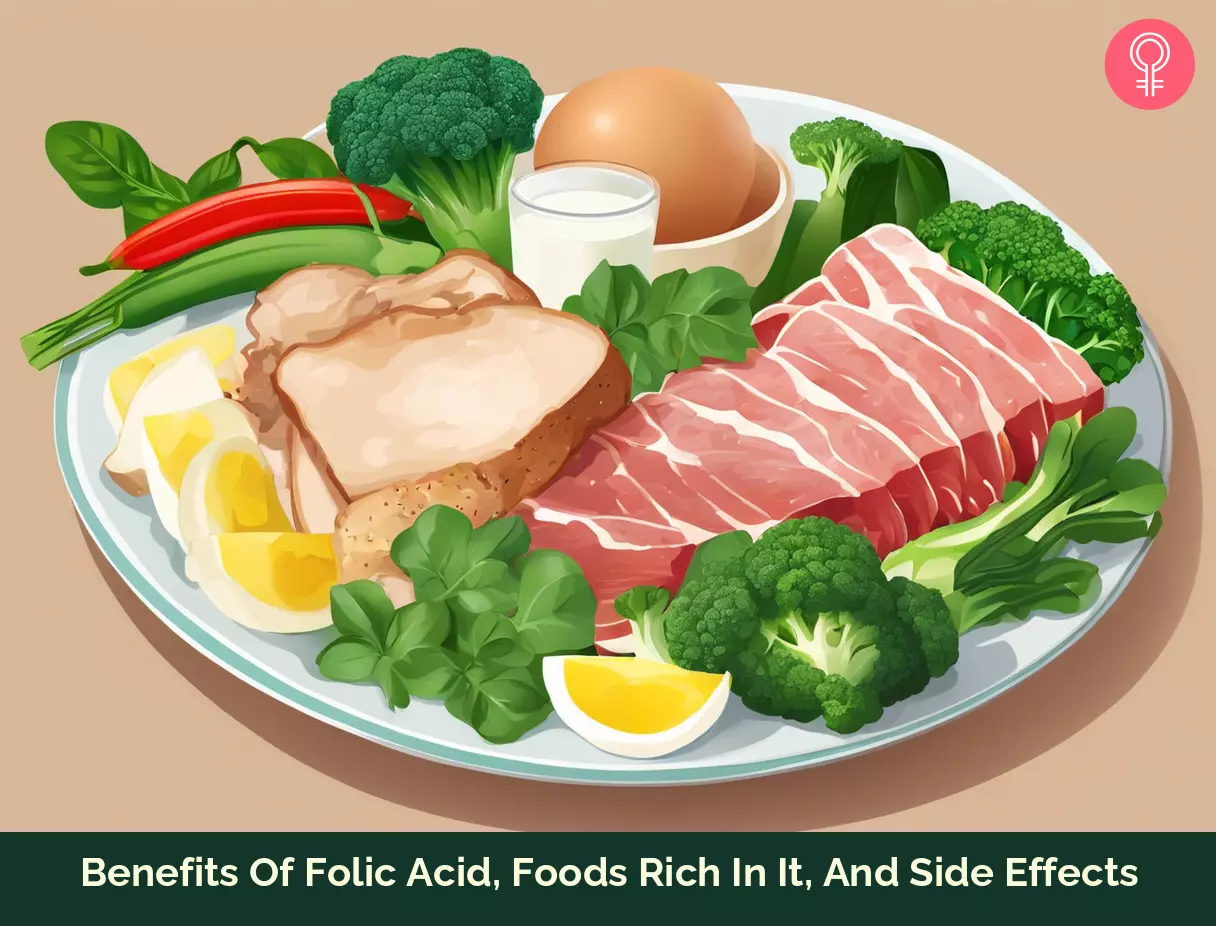
Image: Stable Diffusion/StyleCraze Design Team
Personal Experience: Source
StyleCraze's articles are interwoven with authentic personal narratives that provide depth and resonance to our content. Below are the sources of the personal accounts referenced in this article.
i. Recipe: Greens and mashhttps://twofatvegetarians.wordpress.com/2013/12/12/recipe-greens-and-mash/#comments
References
Articles on StyleCraze are backed by verified information from peer-reviewed and academic research papers, reputed organizations, research institutions, and medical associations to ensure accuracy and relevance. Read our editorial policy to learn more.
- Folate, Oregon State University.
https://lpi.oregonstate.edu/mic/vitamins/folate - Overview on Neural tube defects: from development to physical characteristics
https://pmc.ncbi.nlm.nih.gov/articles/PMC6511489/ - Neural Tube Defects, Folic Acid and Methylation, International Journal of Environmental Research and Public Health, US National Library of Medicine, National Institutes of Health.
https://www.ncbi.nlm.nih.gov/pmc/articles/PMC3799525/ - Prevention of neural tube defects: results of the Medical Research Council Vitamin Study. MRC Vitamin Study Research Group, Lancet, US National Library of Medicine, National Institutes of Health.
https://pubmed.ncbi.nlm.nih.gov/1677062/ - Folic Acid Supplementation for the Prevention of Neural Tube Defects, JAMA Network.
https://jamanetwork.com/journals/jama/fullarticle/2596300 - Homocysteine and atherosclerosis, Current Opinion in Lipidology, US National Library of Medicine, National Institutes of Health.
https://pubmed.ncbi.nlm.nih.gov/10554704/ - Low dietary folate intake is associated with an excess incidence of acute coronary events: The Kuopio Ischemic Heart Disease Risk Factor Study, Circulation.
https://www.ahajournals.org/doi/full/10.1161/01.cir.103.22.2674?url_ver=Z39.88-2003&rfr_id=ori:rid:crossref.org&rfr_dat=cr_pub%3dpubmed - Effect of folic acid supplementation on the progression of carotid intima-media thickness: a meta-analysis of randomized controlled trials, Atherosclerosis, US National Library of Medicine, National Institutes of Health.
https://pubmed.ncbi.nlm.nih.gov/22209480/ - Folate and Its Impact on Cancer Risk, Current Nutrition Reports, US National Library of Medicine, National Institutes of Health.
https://www.ncbi.nlm.nih.gov/pmc/articles/PMC6132377/ - Folate deficiency causes uracil misincorporation into human DNA and chromosome breakage: Implications for cancer and neuronal damage, Proceedings of the National Academy of Sciences of the United States of America, US National Library of Medicine, National Institutes of Health.
https://www.ncbi.nlm.nih.gov/pmc/articles/PMC20362/ - Pooled analyses of 13 prospective cohort studies on folate intake and colon cancer, Cancer Causes Control, US National Library of Medicine, National Institutes of Health.
https://www.ncbi.nlm.nih.gov/pmc/articles/PMC3082430/ - Folate and risk of breast cancer: a meta-analysis, Journal of the National Cancer Institute, US National Library of Medicine, National Institutes of Health.
https://pubmed.ncbi.nlm.nih.gov/17202114/ - Prevalence of Anaemia, Deficiencies of Iron and Folic Acid and Their Determinants in Ethiopian Women, Journal of Health, Population and Nutrition, US National Library of Medicine, National Institutes of Health.
https://www.ncbi.nlm.nih.gov/pmc/articles/PMC2965327/ - Physiology of Folic Acid in Health and Disease, Current Drug Metabolism.
https://citeseerx.ist.psu.edu/viewdoc/download?doi=10.1.1.483.9163&rep=rep1&type=pdf - Folate-Deficiency Anemia, University of Rochester Medical Center.
https://www.urmc.rochester.edu/encyclopedia/content.aspx?ContentTypeID=85&ContentID=P00089 - Folic Acid Supplementation and Pregnancy: More Than Just Neural Tube Defect Prevention, Obstetrics & Gynecology, US National Library of Medicine, National Institutes of Health.
https://www.ncbi.nlm.nih.gov/pmc/articles/PMC3218540/ - Quantitative assessment of nutrition in patients with polycystic ovary syndrome (PCOS), Roczniki Państwowego Zakładu Higieny, US National Library of Medicine, National Institutes of Health.
https://pubmed.ncbi.nlm.nih.gov/27925712/ - Management of women with PCOS using myo-inositol and folic acid. New clinical data and review of the literature, Hormone Molecular Biology and Clinical Investigation, US National Library of Medicine, National Institutes of Health.
https://pubmed.ncbi.nlm.nih.gov/29498933/ - Nutrition of women with hair loss problem during the period of menopause, Przegla̜d menopauzalny, US National Library of Medicine, National Institutes of Health.
https://www.ncbi.nlm.nih.gov/pmc/articles/PMC4828511/ - The Role of Vitamins and Minerals in Hair Loss: A Review, Dermatology and Therapy, US National Library of Medicine, National Institutes of Health.
https://www.ncbi.nlm.nih.gov/pmc/articles/PMC6380979/ - Diet and hair loss: effects of nutrient deficiency and supplement use, Dermatology Practical & Conceptual, US National Library of Medicine, National Institutes of Health.
https://www.ncbi.nlm.nih.gov/pmc/articles/PMC5315033/ - Use of folic acid and vitamin supplementation among adults with depression and anxiety: a cross-sectional, population-based survey, Nutrition Journal, US National Library of Medicine, National Institutes of Health.
https://www.ncbi.nlm.nih.gov/pmc/articles/PMC3200167/ - Folic Acid and Homocysteine in Chronic Kidney Disease and Cardiovascular Disease Progression: Which Comes First?, CardioRenal Medicine, US National Library of Medicine, National Institutes of Health.
https://www.ncbi.nlm.nih.gov/pmc/articles/PMC5662962/ - Effects of folic acid and zinc sulfate on male factor subfertility: a double-blind, randomized, placebo-controlled trial, Fertility and Sterility.
https://citeseerx.ist.psu.edu/viewdoc/download?doi=10.1.1.1032.7256&rep=rep1&type=pdf - Folate and vitamin B12 in idiopathic male infertility, Asian Journal of Andrology, US National Library of Medicine, National Institutes of Health.
https://www.ncbi.nlm.nih.gov/pmc/articles/PMC3372894/ - Section of Medicine, Experimental Medicine & Therapeutics, National Center for Biotechnology Information.
http://citeseerx.ist.psu.edu/viewdoc/download?doi=10.1.1.1032.7256&rep=rep1&type=pdf - Folate, National Institutes of Health.
https://ods.od.nih.gov/factsheets/Folate-HealthProfessional/#h3 - Vitamin B12 in Health and Disease, Nutrients Journal, US National Library of Medicine, National Institutes of Health.
https://www.ncbi.nlm.nih.gov/pmc/articles/PMC3257642/ - Folate in Human Health and Disease, Wiley Online Library, ResearchGate
https://www.researchgate.net/publication/291413621_Folate_in_Human_Health_and_Disease - Decreased Vitamin B12 and Folic Acid Concentrations in Acne Patients After Isotretinoin Therapy: A Controlled Study, Indian Journal of Dermatology, US National Library of Medicine, National Institutes of Health.
https://www.ncbi.nlm.nih.gov/pmc/articles/PMC4248518/ - Is High Folic Acid Intake a Risk Factor for Autism?—A Review, Brain Sciences, US National Library of Medicine, National Institutes of Health.
https://www.ncbi.nlm.nih.gov/pmc/articles/PMC5704156/ - Folic Acid Supplementation Suppresses Sleep Deprivation-Induced Telomere Dysfunction and Senescence-Associated Secretory Phenotype (SASP), US National Library of Medicine, National Institutes of Health.
https://pubmed.ncbi.nlm.nih.gov/31949878/
Read full bio of Alexandra Dusenberry
Read full bio of Swathi Handoo
Read full bio of Arshiya Syeda
Read full bio of Payal Karnik



















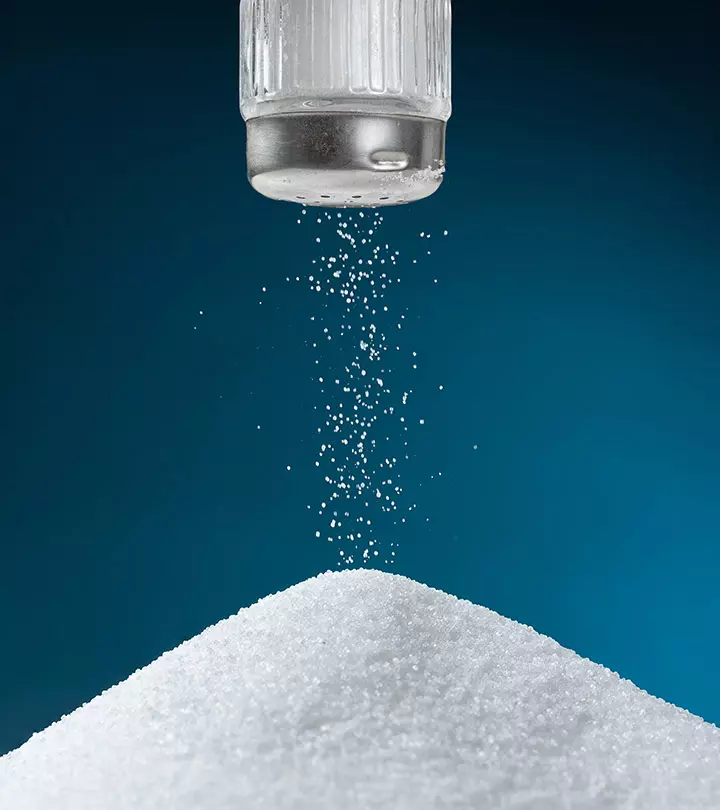
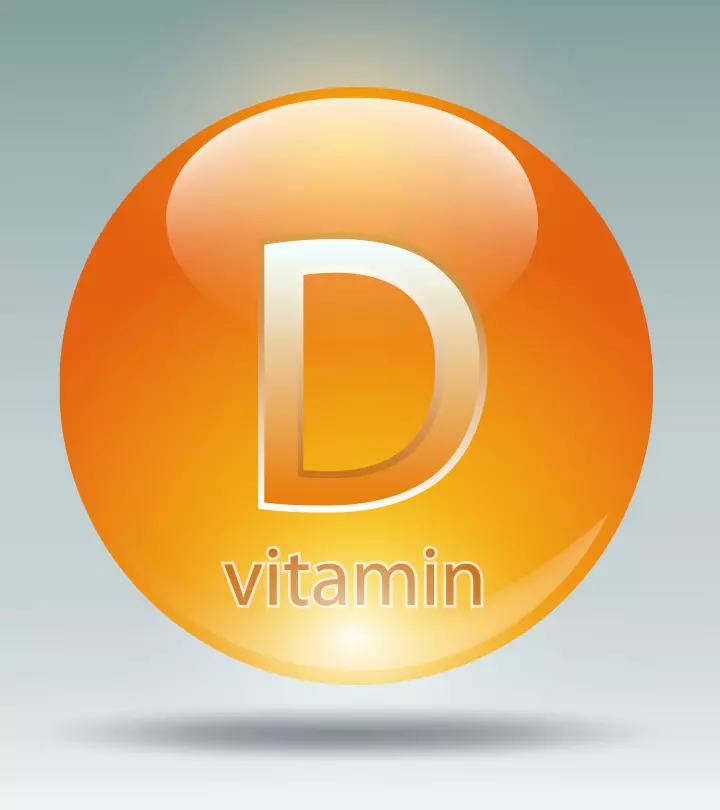



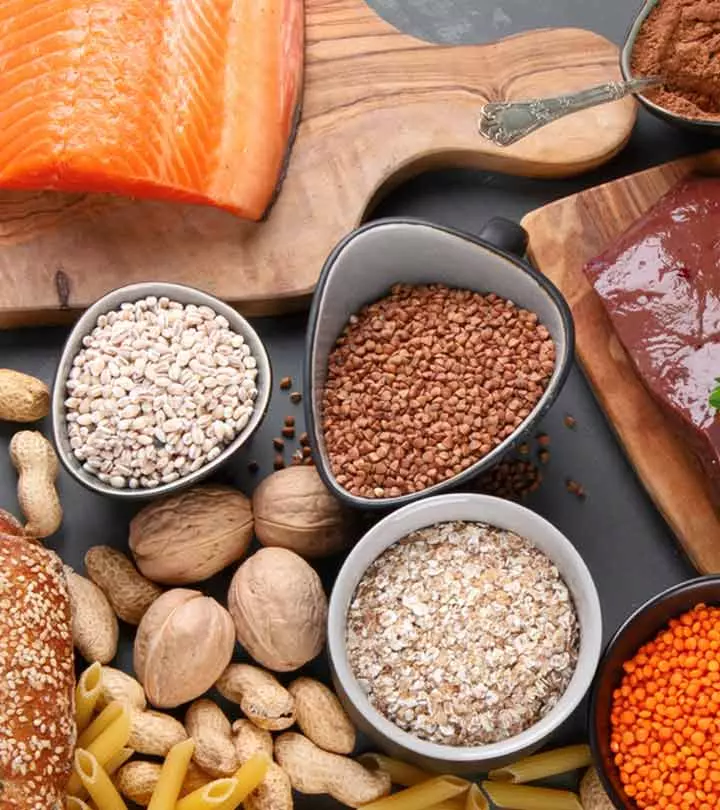
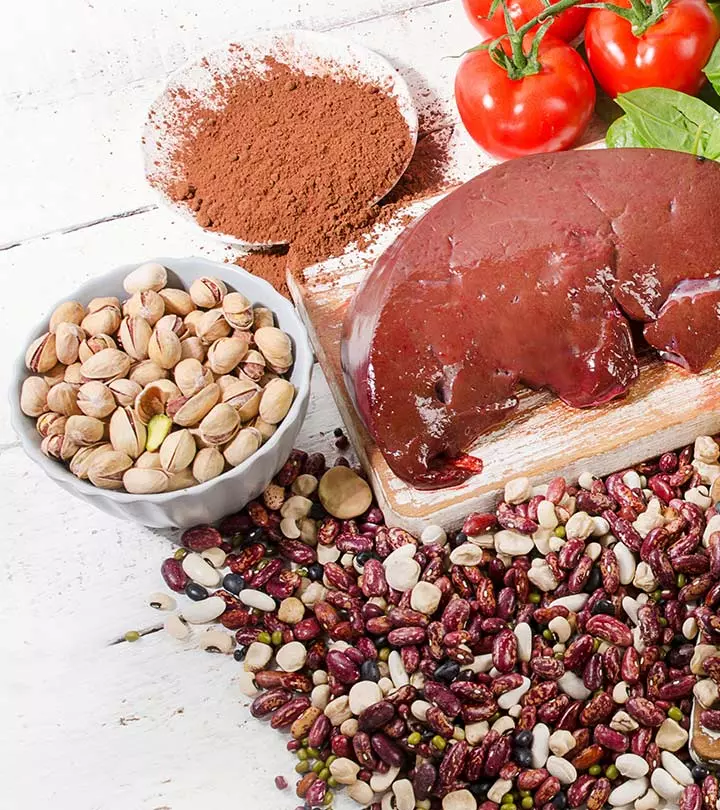

Community Experiences
Join the conversation and become a part of our empowering community! Share your stories, experiences, and insights to connect with other beauty, lifestyle, and health enthusiasts.